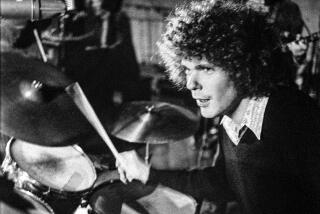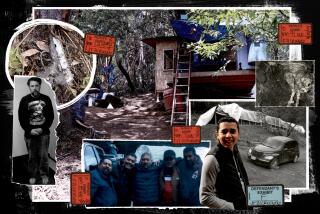Sketchbook Brims With Happiness -- and Despair
- Share via
PRESCOTT, Ariz. — The artist would perch himself on a bench in the town square, sketchbook and pencil in hand.
In between doodles of his beloved wife and “Miss Kitty” the pet cat, he’d fill page after page with the other subjects that consumed him: the panhandlers who sat under elm trees hungering for pocket change as lovers strolled to dinner and children played on the grass.
Happiness and despair competed for space in the picturesque plaza, as well as in the artist’s sketchbook and heart.
Sometimes, the vagrants he studied would notice the pencil and book and hesitantly approach. He’d share his drawings. They’d talk. Sooner or later, the artist would brave the question:
Would you happen to know my son?
He might pull out another sketch, crinkled and watermarked. It showed a man’s face, masked by a thick beard and shoulder-length, shaggy hair. Shadows wreathed the eyes, which stared, hardened and defeated, at nothing.
Under the image, in block letters, was one word: “JIMMY.”
The artist went by the same name. Jim Willoughby was known around town. He was a successful cartoonist whose work appeared twice-weekly in the Daily Courier newspaper, usually lampooning the mayor or the town council’s latest pet project. Years before, he’d worked at Hanna-Barbera and Walt Disney, helping give life to Scooby Doo, Yogi Bear, Darkwing Duck.
His art had been dedicated to making folks smile. Few knew that his gift had also become an outlet for his grief.
They never saw all the other drawings, tucked into sketchbooks and buried inside boxes at home -- of the child whose loss tormented him, of the panhandler he called son.
*
“My son, my son. What happened? You let a lot of people down but mainly yourself.” -- Caption on a pencil and ink sketch of Jimmy, eyes downcast, walking alone on the street.
*
Long before the sadness, there was the joy of being a father. That, too, Jim Willoughby poured into his art, through the cards he drew by the dozens for his boys, Jimmy and David. These arrived at his ex-wife’s house in between his scheduled visits, illustrated with some creature or toy or spectacle.
For Jimmy’s 6th birthday, a lion and cheetah chitchatting. When Jimmy was sick, a firetruck and a get-well-soon message. A boy climbing a cliff as another boy stood watching: “Someday maybe we’ll all get to climb a real high mountain like this. Until then, we’ll practice on the little ones.”
He signed them, “Love, Daddy.”
Divorced when his sons were toddlers, Willoughby wasn’t satisfied being a part-time dad. He was 9 when his own father died following a bout with tuberculosis. Two months later, his mother fell ill and was admitted to a TB sanitarium. Willoughby, his brother and sister were sent to live in a children’s home for six years. He never wanted his own boys to experience the loneliness that accompanies estrangement.
Jimmy was 11, David 9, when Willoughby won full custody. He quit his job as an analyst at an aerospace technology firm to stay home, freelance cartoons and raise his kids.
He wasn’t terribly strict, but Willoughby had high expectations for them both. When David got his black belt in karate, Willoughby persuaded his shy son to be interviewed for a newspaper story. When David later began working in construction, Willoughby urged him to pursue a contractor’s license.
Jimmy, ruggedly handsome with dark hair and a movie-star smile, excelled as a catcher on his high school and college baseball teams, eventually landing a spot on a minor league club. When Jimmy was cut from the team, Willoughby confronted the coach, demanding to know why. Still, Jimmy bounced back, finding work with Motel 6 and rising to regional vice president.
What, exactly, went wrong and why? Over the years, as the elder Willoughby remarried and settled in Prescott, he would dwell on these questions.
“It wouldn’t be for me to judge what kind of father I was,” he said in a journal entry. “Conscientious, loving, doting, hopeful -- these things I was but the end product(s) speak for themselves. My efforts appear to have been in vain ... “
Above one sketch, he wrote of dreaming about Jimmy, “begging ... on a street corner. Disturbing.”
*
“From Catcher to Panhandler.” -- Ink sketch of Jimmy, his left hand extended in a silent appeal, his right holding a container full of coins.
*
The Willoughby boys admittedly liked their booze, but when David visited his brother the “V.P.,” he says he discovered Jimmy’s taste for cocaine as well. Jimmy didn’t bother hiding the alcohol and drugs from his sibling, although David suspects he did from their father. Then Jimmy lost his job and joined Jim Willoughby and his wife, Sue, in Prescott.
The city, in the cool pine mountains north of Phoenix, calls itself “Everybody’s Hometown,” but the strip around the courthouse plaza goes by another moniker: “Whiskey Row.” Old-time saloons sit next to modernized pubs offering karaoke and shots.
Jimmy, then 43, talked about using his savings to open a pizza place, but the money ran out. He rented a house, but fell behind in rent and was evicted. He moved in with a friend, but spent his days on Whiskey Row.
The arrests came next, for driving under the influence. Then one day, while drunk, he fell on the pavement and suffered a head injury, leaving him hospitalized for months and partially brain damaged.
His father and Sue beseeched him to get help but knew they couldn’t force him. “You can’t support a person who doesn’t want to help themselves,” Sue would say. David was out of the picture, living in California and, he says, dealing with his own drinking problem.
So in 1998, when Jimmy got out of the hospital, he found himself on the streets. And he began showing up in his father’s sketchbooks and journals.
There were the courtroom scenes of a ponytailed man labeled “DUI Defendant” or a bearded figure in arm shackles.
The hospital sketches of a grim-faced patient in a wheelchair. “Eyes are heavy-lidded, hair is a mess -- badly chopped. Mouth, a thin line, protrudes strangely. Depressing.”
The special-occasion remembrances, so different from those once sent to the boy who liked lions. “Jimmy’s 45th Birthday. He was doing real well. But then he made bad choices in friends and lifestyle and he is where he is because of it. Happy Birthday Jimmy.”
Among these were sprinkled self-portraits, drawings of a man with his face scratched out in black -- the dark shadow of self-doubt and depression that haunted Willoughby. “I feel I am coming apart sometimes. Today is one of those times,” he wrote. “I vacillate between thoughts of trying to rehabilitate him and realizing I can’t.
On the outside, Willoughby remained the cartoonist with a dashing grin beneath his bushy mustache. He doted on his wife, his “Sweet Sue,” and tried to live life based upon a favorite credo: “Make good memories.”
The visits to the courthouse plaza came in between all that, on his way to and from the office, before lunch or after errands. Most co-workers never knew about these searches for his son; he rarely spoke of Jimmy -- except with Sue.
At the dinner table, a number of times he asked her: Do you think he’s still alive?
Yes, Sue said, attempting to ease his mind.
Five days before Christmas 2000, he found out. The Willoughbys were headed to the auto shop when they spotted him: A bearded vagabond sitting at a bench in the plaza. Willoughby dropped off Sue and headed back. Stepping out of the car, he heard, “Dad!”
Jimmy had a grocery sack stuffed with clothing on the ground next to him. He looked ragged, beaten down. Willoughby sat next to his son and they talked for a few moments, but was overcome with sadness, anger. He excused himself and left. This moment, too, he recorded in his journal along with a sketch of Jimmy on the bench.
“Next day,” Willoughby wrote, “I passed by and he was standing near the same picnic bench, looking off in the general direction of the Palace. Heartbreaking.”
Jimmy disappeared after that, although his father kept stopping by the plaza in hopes of finding him.
Do you think he’s still alive? Willoughby would ask his wife again.
Sue eventually changed her mind. No, she said.
*
The phone call came earlier this year, from a crisis center in Seattle. The counselor said a man had been seeking treatment for several years and finally revealed he had family in Arizona.
Jimmy Willoughby wanted to speak with his dad.
“My husband would’ve cut off his left arm just to know that Jimmy was alive,” Sue Willoughby told the counselor.
She explained: Jimmy’s father had died at age 76.
It happened only a few months before the call.
Afterward, Sue she found the old sketchbooks and his many drawings of Jimmy and other homeless men and women. A former museum director, Sue had just received a newsletter about a local exhibition in the works featuring the art of the homeless, or drawings depicting them.
She donated Willoughby’s sketches, along with an essay explaining how her husband spent the last years of his life “tormented and agonizing over the loss of his son.”
She concluded the essay with a message to anyone living on the streets: “Please pick up the phone once in a while and dial home to let someone know you are alive. ... Just do it.”
Acquaintances and colleagues were taken aback by the dark side of the spirited man they thought they knew.
“He was two persons in one body,” says Ben Hansen, Willoughby’s editor and friend. “He was this wonderful, funny, talented, incredible person -- and then he was so deeply sad inside.”
Jimmy has since been in contact with his brother, David. The last David heard, he was still in Washington state and trying to find a way off the streets.
As for his father’s sketches, Jimmy knows nothing about them. Sue says she might one day send him copies. Maybe then he’d understand that he was never alone, that all his father really wanted was for his lost son to find his way home.
This story is based on interviews with Jim Willoughby’s colleagues, his son, David, and his wife, Sue, who provided access to her husband’s sketchbooks and journals. Attempts to contact Jimmy were unsuccessful.
More to Read
Sign up for The Wild
We’ll help you find the best places to hike, bike and run, as well as the perfect silent spots for meditation and yoga.
You may occasionally receive promotional content from the Los Angeles Times.






